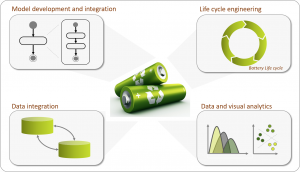SIMTEGRAL – Integrated multi-scale system simulation and sustainability assessment of primary and circular raw material supply chains for lithium-ion batteries
The raw materials used in lithium-ion batteries, not only determine the technical properties, but also significantly contribute to the manufacturing costs of batteries, and have environmental and social impacts. An economical, environmentally efficient, and socially acceptable supply chain of battery raw materials is of great strategic importance for the competitiveness of the German industries. The battery value chain can be shaped, and the impacts significantly influenced, by considering the – raw materials used, the mining region and technology, and efficient raw material recovery. Currently, however, there is insufficient detailed data available for the evaluation of the so-called raw material supply chain, i.e., the raw material supply chain from the mines to the product use and recycling. Furthermore, there is a also lack of reliable models to map the complex interactions to derive recommendations for action.
SIMTEGRAL aims at providing a robust computational methodology to support the design of environmentally consistent circular supply chains for traction batteries. Physically-based models of the most important processes for the production of primary and the recovery of secondary raw materials for lithium-ion batteries are to be developed and experimentally validated. These models will provide process data of higher quality and resolution. They will be linked and integrated into a higher-level assessment approach. Based on this, a techno-economic, social, and environmental assessment will be carried out to gain insights into the design of sustainable value chains.
The aim is to determine meaningful key figures on the energy, resource efficiency, quality, raw material purity, cost-effectiveness, social risks, and the environmental impacts of battery raw materials. In this way, the project partners will identify potentials for improvement along the battery value chain and formulate corresponding recommendations for action in research and industry.
The SIMTEGRAL project contributes to the further development of battery recycling and increasing efficiency in raw material recovery. The cost reduction in secondary raw material production and a reduction in Germany’s dependence on raw materials will enable an increase in the economic efficiency of battery applications in the long term.
Contact
Technische Universität Braunschweig – Battery LabFactory Braunschweig (BLB) – Institute of Machine Tools and Production Technology (IWF)
Prof. Dr.-Ing. Christoph Herrmann
Dr.-Ing. Felipe Cerdas
Langer Kamp 19b, 38100 Braunschweig
Duration of project
01.11.2020 – 31.10.2023
Involved partners
